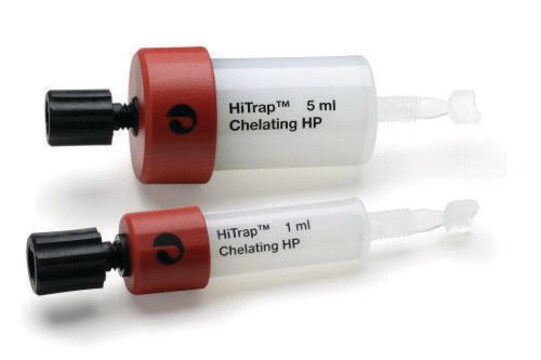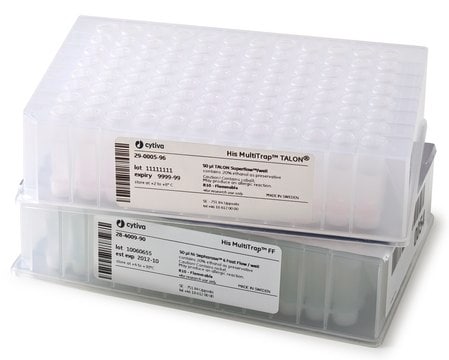GE17-5319-01
HisTrap™ Fast Flow
Cytiva 17-5319-01, pack of 5 × 1 mL
About This Item
Produits recommandés
Conditionnement
pack of 5 × 1 mL
Fabricant/nom de marque
Cytiva 17-5319-01
Paramètres
<20 mL/min flow rate
42 psi
Taille du lit
16 mm × 25 mm
Volume du lit
5 mL
D.I. de la colonne
16 mm
Matrice
6% cross-linked agarose
Taille des particules
45-165 μm
Diamètre moyen
90 μm
cleaning
2-14(Ni2+-stripped medium.)
working range
3-12(Ni2+-stripped medium.)
Capacité
~40 mg binding capacity(histidine-tagged protein)
Adéquation
suitable for bioprocess medium
Description générale
Ni Sepharose™ 6 Fast Flow consists of 90 μm beads of highly cross-linked agarose, to which a chelating ligand has been immobilized. This chelating ligand is charged with Ni2+ ions, the first-choice metal ion for purifying most histidine-tagged proteins. The negligible leakage of Ni2+ ions from the matrix ensures reliable capture of histidine-tagged proteins in repeated IMAC purifications.
The high flow rates made possible by the Ni Sepharose™ 6 Fast Flow matrix make HisTrap™ FF columns well suited for small scale-up. Capacity can be increased by connecting columns in series. HiTrap® IMAC FF is the product of choice when charging the medium with different metal ions for optimization of purification protocols.
Caractéristiques et avantages
- High binding capacity, approx. 40 mg/mL medium.
- Negligible leakage of Ni2+.
- Prepacked columns offer reliable and convenient time-saving purification of histidinetagged recombinant proteins.
- Compatible with a wide range of reducing agents, detergents, denaturants, and other additives.
Stockage et stabilité
Remarque sur l'analyse
Informations légales
Mention d'avertissement
Warning
Mentions de danger
Conseils de prudence
Code de la classe de stockage
3 - Flammable liquids
Certificats d'analyse (COA)
Recherchez un Certificats d'analyse (COA) en saisissant le numéro de lot du produit. Les numéros de lot figurent sur l'étiquette du produit après les mots "Lot" ou "Batch".
Déjà en possession de ce produit ?
Retrouvez la documentation relative aux produits que vous avez récemment achetés dans la Bibliothèque de documents.
Les clients ont également consulté
Articles
This page shows high-throughput screening using His MultiTrap™ HP and His MultiTrap™ FF 96-well filter plates from Cytiva.
Protocoles
This page shows how to perform a cell disruption und prepare membranes with products from Cytiva.
This page shows the purification strategy of capture, intermediate purification, and polishing (CIPP) in affinity chromatography using Cytiva products.
Contenu apparenté
Purification methods for downstream analysis reduce sample complexity, remove interferences, and concentrate analytes for more accurate results.
Diverses méthodes de purification peuvent être utilisées pour préparer un échantillon avant l'analyse. La purification permet de réduire la complexité de l'échantillon, d'éliminer les interférences et de concentrer un analyte avant l'analyse.
Diverses méthodes de purification peuvent être utilisées pour préparer un échantillon avant l'analyse. La purification permet de réduire la complexité de l'échantillon, d'éliminer les interférences et de concentrer un analyte avant l'analyse.
Diverses méthodes de purification peuvent être utilisées pour préparer un échantillon avant l'analyse. La purification permet de réduire la complexité de l'échantillon, d'éliminer les interférences et de concentrer un analyte avant l'analyse.
Notre équipe de scientifiques dispose d'une expérience dans tous les secteurs de la recherche, notamment en sciences de la vie, science des matériaux, synthèse chimique, chromatographie, analyse et dans de nombreux autres domaines..
Contacter notre Service technique









